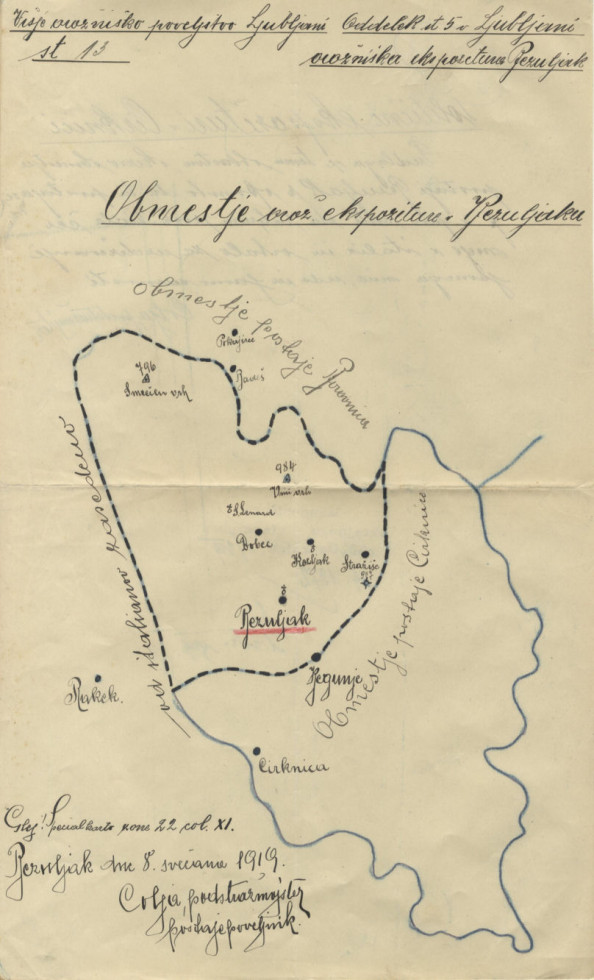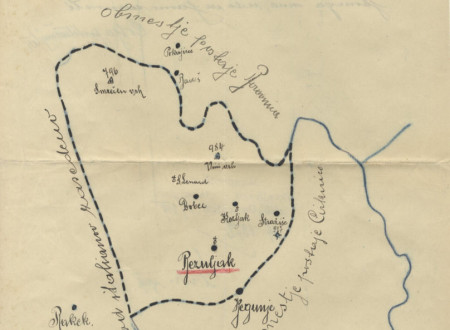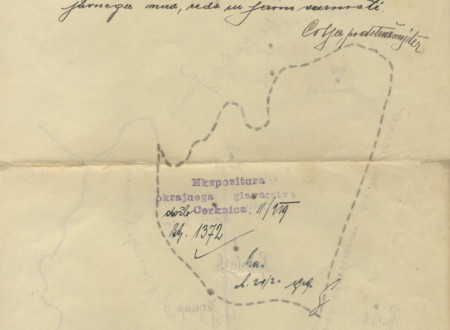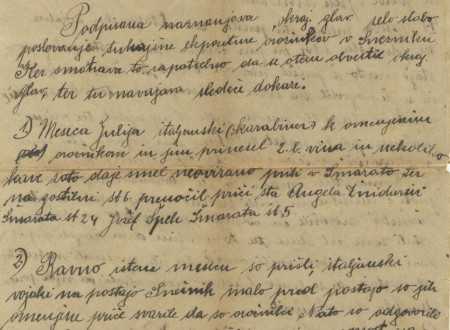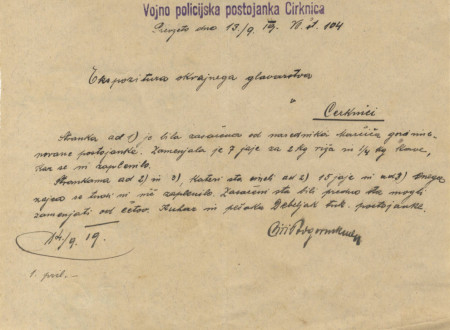»... Seven Eggs for Two Kilos of Rice and a Quarter of a Kilo of Coffee …«
Smuggling and Contraband Along the Italian Border
Immediately after World War I, Italy occupied a substantial part of Logatec district, including the town of Logatec itself. For the time until the signing of the Treaty of Rapallo (in November 1920), the National Government for Slovenia issued two proclamations in November and December of 1918, by means of which it established a branch in Cerknica, which was to manage unoccupied municipalities of the Logatec district: Begunje, Cerknica, Sv. Vid, Bloke, Lož and Stari trg. Žiri municipality was incorporated into the district administrative authority of Kranj, and the unoccupied part of the municipality Rovte (Praprotno Brdo, Podpesek and Sovra) was in March 1920 incorporated into the district administrative authority of Ljubljana- surroundings. After the signing of the Treaty of Rapallo, the situation gradually developed towards what it had been before the Italian occupation, and in March 1921 district administrative authority of Logatec became operative once again.
The new state border, which replaced the former demarcation line of November 1918, mostly followed the line laid down by the secret Treaty of London concluded between Italy and the Triple Entente in 1915. State border between Italy and Yugoslavia ran along the line Peč, Jalovec, Triglav, Možic, Črni vrh nad Cerknim, Blegoš, Bevkov Vrh, Hotedršica, Planina, Javorniki above Cerknica, Bička gora, Snežnik, in such a way that the peaks of Triglav and Blegoš came under Yugoslav rule as well as major parts of Hotedršica and Planina.
The border made a deep cut into space, time and the lives of people. It cut through areas, municipalities and villages that once belonged to the same state. Suddenly, many people who lived near the border found themselves separated from their forests, meadows or fields which remained on the other side of the border. Special passes were needed for people who owned real estates in both of the neighbouring states, as well as for those who made daily trips to help out on the farms. The crossing of the border, however, was not simple, and was only allowed at certain crossing points and at certain times. Massive daily crossing of the border led to thriving trade of smuggling and contraband. Although officially there is no distinction between the two terms (smuggling, Italian contrabbando), they were, however, perceived differently by the people.
While contraband was perceived as acceptable among the population, smuggling had always had a negative connotation. Smugglers were seen as striving only for bigger profit, whereas contrabandists were doing it to relieve their economic and social crisis, and to be able to pay state taxes and support their families during times of crisis. Between both wars, contraband included every action by means of which an individual was able to deceive financial guard, i. e. tax office within state, while smuggling was perceived more as an international illegal trade. Smugglers also carried weapons and got into fights with financial guard, while contrabandists never did such a thing but relied on their wit and shrewdness to conduct their business without being found out very often. In Hotedršica, contrabandists were divided into big contrabandists, who were horse dealers, and smaller contrabandists, who were mostly engaged in smuggling saccharin, coffee, tobacco, rice, flour and textile.
Records of district administrative authority Logatec bear witness to such lively happenings of that time and place. Gendarmerie for example complained for not receiving more sugar than the rest of the population, even though the life of a police officer was much more strenuous since “they have to make inquiries all the time and spend their nights on the lookout for thieves and for smugglers of cattle and horses”. The least they could have to help them do their hard work would be a cup of sweet tea, since “there is nothing else to get”. How they tried to improve their situation can be seen from reports that it was the police officers themselves who were secretly doing business with Italians or keeping the confiscated goods for themselves. Italian soldiers also came and tried to exchange flour and rice for eggs and tobacco.
One could earn a lot of money with smuggling, which is why people again and again took the risk of losing not only their goods and money if they got caught, but sometimes also their lives. When several men were caught with three cows, the cattle was confiscated and sold at an auction for 2932 krone, and on top of that they needed to pay a 900 krone fine. Half of the amount for which the cows were sold was allocated to food provision department, and the other half was given to gendarmerie station for a reward and encouragement. The reward was sometimes also shared with the person who informed gendarmerie about a certain smuggler, and such informer often turned out to be a close neighbour. Dealers often made the usual excuses that they were unaware of the fact that they were not supposed to sell outside the district, or that they were forced to sell their cattle because they ran out of fodder. Such excuses were usually of little help, but sometimes the smugglers were given a lesser sentence because of their extreme poverty.
Even the smallest of offences were punished. When once a woman was caught attempting to carry two hens over the demarcation line and exchange them for some rice, both hens were confiscated and sold at the auction. She was sentenced to pay a fine of 10 krone or spend a day in prison. Another woman who managed to exchange some eggs for rice and coffee had more luck. Because she promised never to do this again, she was left off with only a warning. The same was true for two women who were caught with 15 eggs and a rabbit before they were able to make the exchange.
Demarcation line from Klanska Polica to Dreviše was 62 kilometres long, on to Zaplana there was another 10 kilometres, and from Zaplana to Mala Oselica near Cerkno 40-45 kilometres. Smuggling route ran from railway stations Pivka, Prestranek, Postojna, Rakek, Planina, Logatec, over Snežnik into Loška dolina, and on forest paths of Javornik and partly through Menišija and Požganina to Cerknica or through villages of Menišija to Dobec, and from there towards Padež and Pokojišče.
Authorities reported on “entire column of smugglers and dealers coming from Cerknica to Pokojišče and Borovnica and from Dane and Stari trg to Male and Velike Lašče”. Drivers of dealers and guides for mountain tracks charged from 380-450 krone for one single drive or guidance.
Dealers were also getting better and better organized. Anonymous sources claimed that they even had a money fund hidden in Dolenje Jezero and in Dolenja vas, which they used to cover their losses when their goods were confiscated. Horses, and oxen in particular, were bought at fairs and then in large groups taken towards the border. Since their cattle passports were in order, gendarmerie could do nothing to stop such dealings. House searches were also mostly unproductive, since smugglers had their own informers and were always able to remove their “hot stuff” in time.
Since smuggling caused damage on both sides of the border, both states made efforts to restrict such activities by strengthening border zone and tightening border control. Although they sold confiscated goods on public auctions every day and even though the prison in Cerknica was overcrowded, nothing could stop smugglers, it only forced them to become more careful and shrewd.
Olga Pivk


